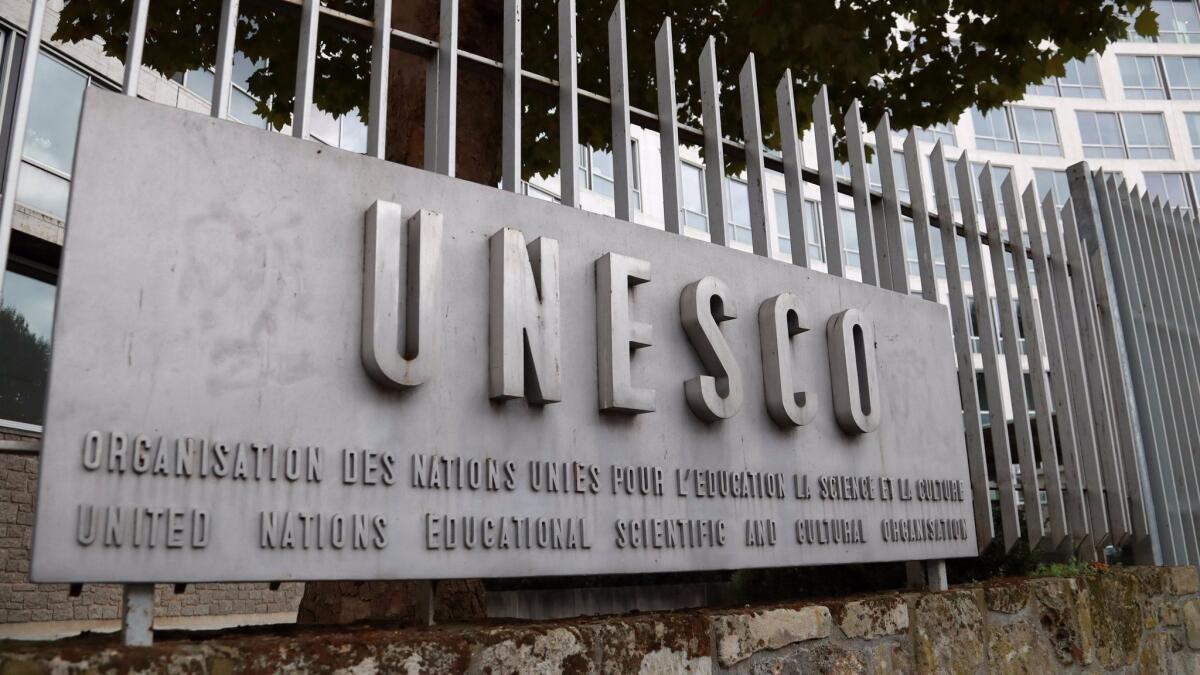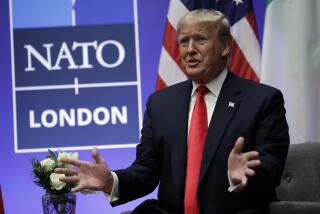Editorial: Withdrawing from UNESCO further isolates the U.S. and risks undercutting international influence

President Trump’s announcement that he is withdrawing the United States from the United Nations Educational, Scientific and Cultural Organization is being framed as a cost-cutting measure — the U.S. is half a billion dollars behind in its dues — and a call for fundamental reform in an organization the U.S. says is plagued by ”anti-Israel bias.” Like so many announcements that come out of the Trump administration, though, that’s mostly smokescreen and bluster. Trump’s ultimate goal is to withdraw the U.S. from crucial international organizations and obligations, reflecting his dangerous mix of isolationism and national chauvinism. It’s also petty.
American complaints about UNESCO go back decades. The U.S. first withdrew from the organization, whose mission is to use cultural and scientific collaboration to find common ground among nations, during the Reagan administration. At that time, the U.S. grumbled about mismanagement, perceived pro-Soviet bias and a Third World outlook that “has exhibited hostility toward the basic institutions of a free society, especially the free market and the free press.” It was an unfortunate decision that was not reversed until 2002, when President George W Bush declared that sufficient reforms had been made and the U.S. rejoined.
Just because the U.S. doesn’t get its way on an issue before an international body doesn’t mean it should take its ball and go home.
In the meantime, Congress passed a law that bars the U.S. from sending money to any U.N. division that accepts the Palestinian Authority as a member. UNESCO voted in 2011 to admit the Palestinian Authority over the Obama administration’s objection, prompting the U.S. to stop paying its $80 million annual UNESCO dues. As a consequence, the U.S. no longer has a vote in UNESCO’s general body, although it still has a vote on the agency’s executive board. The unpaid dues now exceed $500 million, and by withdrawing at the end of 2018, the government hopes to stop adding to the debt.
But the law freezing the payments and Trump’s decision to quit UNESCO are bad policy. Just because the U.S. doesn’t get its way on an issue before an international body doesn’t mean it should take its ball and go home. It’s certainly true that the U.N. and its subordinate agencies have a range of problems, from the cynical and self-serving vetoes cast by permanent members of the Security Council (which have exacerbated problems in Syria and Crimea) to allegations of rape and other crimes by peacekeeping forces. Yet the United Nations remains one of the best efforts at forging international consensus and establishing international norms for acceptable national behavior that the world has seen.
Trump’s isolationist, “go it alone” bent threatens to reduce the role and influence of the United States on major global issues. To take just one example, if Trump hopes to prod Israel (which followed the U.S. and also quit UNESCO this week) and the Palestinian Authority to peacefully resolve one of the world’s most intractable diplomatic problems, it will need wide global networks and support.
One irony here is that the U.S. was integral to the creation of UNESCO, which like the U.N. itself was born of post-World War II efforts to build a framework to bring the world’s nations closer together. Quitting the organization now could also be the first step on an unfortunate slippery slope in which the Palestinian Authority is admitted into other U.N. bodies, triggering the law requiring the U.S. to renege on its dues, and eventually leading the U.N. to deprive the U.S. of votes. That is not a path for successfully pressing causes important to the United States. To that end, Congress should repeal the requirement that dues be withheld before the government loses sway in other U.N. divisions that could accept the Palestinian Authority as a member.
Global peace and prosperity require a certain amount of international cooperation. With its isolationist impulses, the Trump administration ignores both this nation’s history and its best interests. Trump — like many other conservatives — has been critical of the U.N. for years. Last month, he accused it of failing to live up to its potential. But he also promised in a speech before the U.N. that “if we work together and champion truly bold reforms, the United Nations will emerge as a stronger, more effective, more just and greater force for peace and harmony in the world.” Running away from UNESCO does nothing to fulfill that promise.
Follow the Opinion section on Twitter @latimesopinion or Facebook
More to Read
A cure for the common opinion
Get thought-provoking perspectives with our weekly newsletter.
You may occasionally receive promotional content from the Los Angeles Times.










